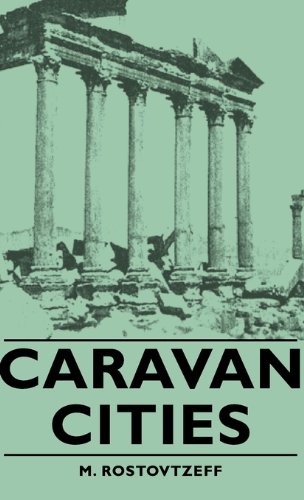Product desciption
Caravan Cities M Rostovtzeff by M. Rostovtzeff 9781443728881, 1443728888 instant download after payment.
CARAVAN CITIES By M. ROSTOVTZEFF. Originally published in 1932. PREFACE: THIS book Is really the outcome of a series of travel sketches written in 1928 while the impressions of my journey to Syria, Arabia, and Palestine In the early part of that year were still fresh in my mind. These sketches first appeared in two Russian newspapers pub lished at Berlin and at Paris, The Helm and Resurrection, and they were reprinted later in the Russian magazine Contemporary Notes ( Paris), this time with certain altera tions and with the addition of several new sketches. Finally, they appeared in book form at Paris in 1931 under the title Blijnem Vostoke. Then the Clarendon Press offered to produce an English edition, but as I was on the point of undertaking another and more ambitious journey to the Near East, I decided to post pone revision for the English edition until my return. It was my intention to revisit the sites which form the subjects of my sketches and also to include lower Mesopotamia, the modern Iraq, in my travels. The new and vivid impressions with which I re turned from this journey, and the opportunity that it gave me of examining the ruins in detail and of ap preciating the enormous advance made by archaeology In the study of these sites, led me to form so many fresh conclusions that I have found myself obliged not merely to revise my text, but even in part to rewrite it. In doing so, I have omitted the last two sketches of the Russian volume, since they dealt with Rhodes, Cyprus, and Mycenaean Greece and not with caravan cities. Whilst on these travels I was able to collect the material with which this book is illustrated. ... The consideration of caravan trade in general raises innumerable problems, of economics, of geo graphy, of climate, and of history, which have never been fully dealt with, and which no scholar has ever attempted to study in this connexion. Consequently, the section that I have devoted to the history of caravan trade in the Near East is no more than a sketch; the outline of a larger work which some one else will fill in in the future. The sections which deal with the caravan cities are equally imperfect. My choice of these cities is acci dental. It is not based on the historical importance of towns concerned but on the amount of information available; or, to be more precise, on the state of pre servation of the ruins. It is obvious that in Syria, for example, such a town as Damascus has a far longer and far more instructive history as a caravan city than Palmyra, while in Transjordania Amman is larger and more important than Jerash. In northern Syria, again, the history of Aleppo through the centuries would be more instructive than that of Dura. But so little of the history of these important towns has survived and the little that has survived is of so fragmentary a nature, that the picture we can form of them is necessarily Incomplete.


